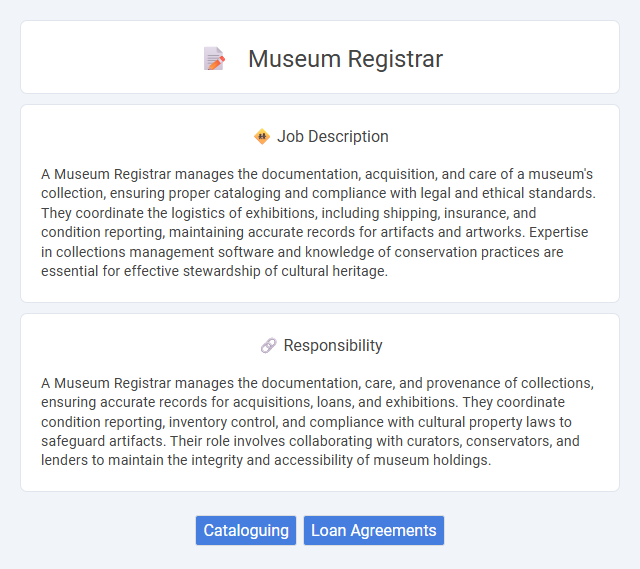
A Museum Registrar manages the documentation, acquisition, and care of a museum's collection, ensuring proper cataloging and compliance with legal and ethical standards. They coordinate the logistics of exhibitions, including shipping, insurance, and condition reporting, maintaining accurate records for artifacts and artworks. Expertise in collections management software and knowledge of conservation practices are essential for effective stewardship of cultural heritage.
Individuals with strong organizational skills and attention to detail are likely suitable for a Museum Registrar role, as the job requires managing collections accurately and ensuring proper documentation. People who are comfortable working independently and have an interest in art, history, or culture may find this position fulfilling and well-aligned with their strengths. Those who prefer fast-paced, highly social environments might find the role less suitable due to its focused, methodical nature.
Qualification
A Museum Registrar must possess a bachelor's degree in museum studies, art history, or a related field, with many institutions preferring candidates holding a master's degree. Key qualifications include expertise in collections management, familiarity with cataloging software, and strong knowledge of preservation standards and legal regulations regarding cultural property. Attention to detail, excellent organizational skills, and experience in inventory control are essential to ensure the accurate documentation and security of museum artifacts.
Responsibility
A Museum Registrar manages the documentation, care, and provenance of collections, ensuring accurate records for acquisitions, loans, and exhibitions. They coordinate condition reporting, inventory control, and compliance with cultural property laws to safeguard artifacts. Their role involves collaborating with curators, conservators, and lenders to maintain the integrity and accessibility of museum holdings.
Benefit
Museum Registrar positions likely offer benefits such as comprehensive health insurance, retirement plans, and paid time off, contributing to long-term job security and well-being. Access to professional development opportunities and networking events may enhance career growth and expertise in museum collection management. These benefits could improve overall job satisfaction and work-life balance for employees in this role.
Challenge
Museum registrars likely face challenges in maintaining accurate and detailed records of valuable collections while ensuring compliance with legal and ethical standards. The role probably involves managing complex logistics for acquisitions, loans, and exhibitions, which can require meticulous attention to detail and strong organizational skills. Navigating evolving technologies and data management systems may also present ongoing challenges that demand adaptability and continuous learning.
Career Advancement
Museum registrar roles offer significant career advancement opportunities through gaining expertise in collections management, documentation, and legal compliance. Progression often leads to senior registrar positions, curatorial roles, or leadership in collections management departments. Developing skills in digital asset management and conservation enhances prospects for advancement within prominent museums and cultural institutions.
Key Terms
Cataloguing
A Museum Registrar specializing in cataloguing is responsible for accurately documenting and maintaining detailed records of museum collections, ensuring each item's provenance, condition, and location are systematically recorded. They employ advanced database management systems and adhere to museum standards and legal regulations to guarantee the integrity and accessibility of collection data. Expertise in metadata standards, object identification, and digital cataloguing tools is essential for efficient collection stewardship and research facilitation.
Loan Agreements
Museum Registrars manage and oversee loan agreements to ensure the proper documentation, condition reporting, and legal compliance for borrowed artifacts. They coordinate with lenders, transporters, and insurance providers to guarantee the safe handling and timely return of loaned items. Accurate record-keeping and adherence to loan terms are critical to protect the collection and maintain institutional accountability.
 kuljobs.com
kuljobs.com